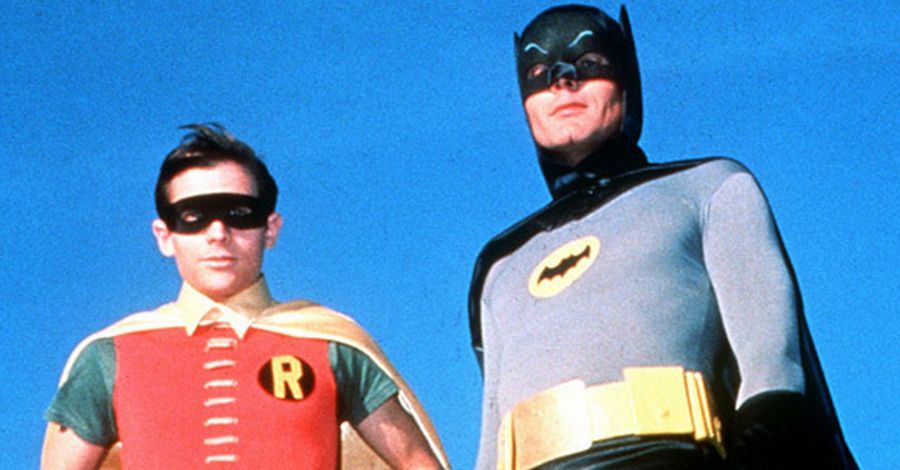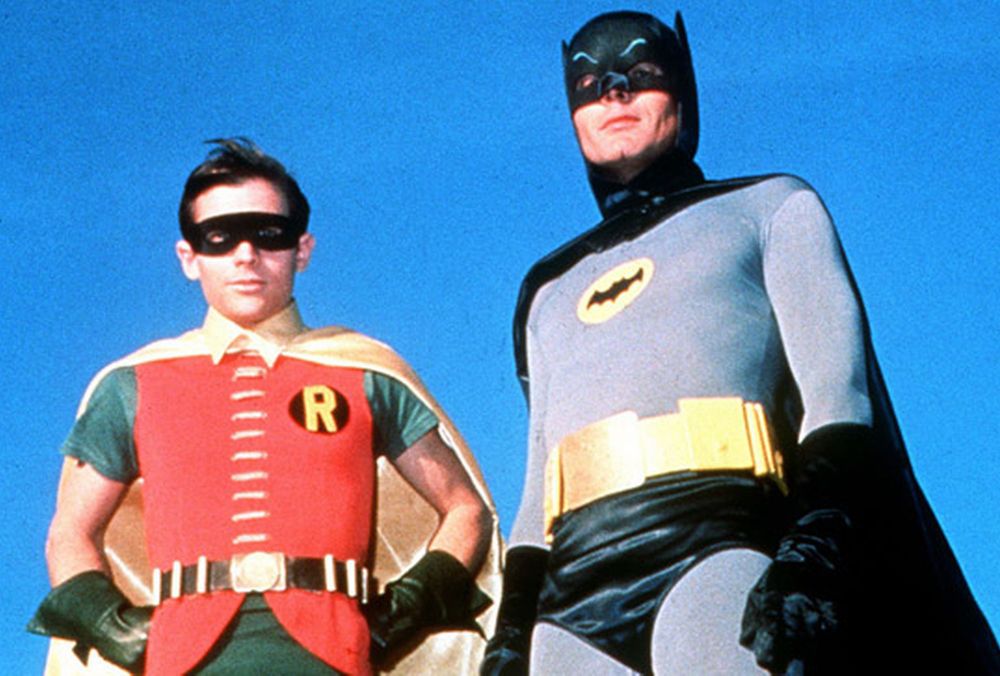"Bam! Pow! Comics aren't just for kids anymore!" If you're a comics fan, chances are you've seen that headline more than once in mainstream outlets over the years --and recoiled like a bashed villain at each "Pow!" and "Biff!" "Curse you, Batman!" you might have said as you stumbled away rubbing your bruised noggin. "You've thwarted me again!"
The Batman you're cursing is, of course, from the television series starring Adam West, which is finally being released this week on DVD and Blu-ray after decades of rights disputes. Debuting in 1966, West's "Batman" was a massive pop culture fad which (briefly) dominated ratings and turned phrases like, "Bam! Pow!" and "Holy [catchphrase], Batman!" into memes before the term 'meme' was invented.
CBR TV: Adam West on "Batman's" Resurgent Popularity, His Unique Voice
"Batman" was a hit, but fan reaction was, and to some extent remains, ambivalent. The show, with its Shark Repellant Bat Spray and paunchy hero who always obeyed traffic signals, fixed Batman (and superheroes, and comic books) in the public consciousness as figures of elaborate silliness. Two decades after the show ended, Batman fans were still smarting at the parody, resulting in widespread skepticism when Tim Burton cast Michael Keaton (best known for comedy at that point in his career) as Batman in the 1989 film. Warner Bros. was just "after the money of all the people who only remember Batman as a buffoon with a twerp for a sidekick in the campy TV series from the '60s," one cynical fan declared. Even those who appreciate the original series hurry to acknowledge that silly Batman is not the one true Batman. "We all now know Batman as The Dark Knight, and that's how it should be these days," as a pro-Adam West article declared.
But is the Dark Knight really better, or more true to the character and to superheroes than the "Bright Knight," as West has described his take? Serious Bat aficionados may look to West as a regrettable or enjoyable aberration, but the truth is, there's nothing particularly aberrant about superhero humor or parody. Silliness has been built into the genre from the beginning. Two of the most acclaimed superhero comics of the Golden Age are Jack Cole's "Plastic Man" and C.C. Beck's "Captain Marvel," both of which were suffused with silliness. Captain Marvel's arch-nemesis, an intelligent worm known as Mr. Mind, would have fit nicely in Adam West's rogues gallery. Harvey Kurtzman and Wally Wood's 1953 superhero parody "Superduperman" is critically acclaimed, as is Dave Sim's "Cerebus," which included numerous superhero parodies through the vehicle of recurring character The Cockroach. Chris Ware's Jimmy Corrigan strips featuring 'Superman' and Daniel Clowes' "The Death Ray" are in many respects superhero parodies as well. Looking at the combined work of Cole, Beck, Kurtzman, Sim, Ware and Clowes, you could argue that humor and parody don't diminish superhero comics, but are instead a highly respected form of those comics.
The Adam West Batman doesn't have the same critical standing as Harvey Kurtzman or Chris Ware, it's true. But maybe it should. Thanks to the show's creator, William Dozier, "Batman" was far more engaged with high art than virtually any other screen version of the Caped Crusader has ever been. In Les Daniels' "Batman: The Complete History," it's said that Andy Warhol himself was at the "discotheque frug party" for the network's party celebrating the series' debut, and that's hardly a surprise. Pop art sensibility echoes throughout the show, from its bright, primary-colored, distinctive visuals to its flamboyant campiness to its hip Nelson Riddle/Billy May jazz soundtrack. Pop art may have appropriated comics, and "Batman" turned around and appropriated Pop art right back. Lichtenstein repurposed comics panels for a gallery setting, simultaneously mocking comics' simple-minded pulp and high art's arid hermetic snootiness. The Batman TV show did the same, but further blurred the lines between them. In the 1966 "Batman" film, when the clean-cut military personnel uncover their hats to salute the preposterous toy merchandise-ready Batcopter flying overhead, is it Pop art being tweaked for its worship of product placement, or superheroes being tweaked for their resolute good-always-wins squareness? When Bruce and Dick race to the secret Bat poles in that concealed closet, are comics being celebrated for campy subtext, or Pop art? What's the difference? Pop art opened the gallery to low art; Batman, in its turn, transformed the gallery into the kind of crazed Pop fad that Pop art had fetishized. It made Pop into Pop so effectively that you couldn't tell which was which.
Rather than viewing "Batman" as a detour from superhero seriousness, it could instead be seen as a road to seriousness not taken -- a path to cultural relevance via hip, cool knowingness and ironic smarts rather than through grim and gritty dourness. But if you tilt your head just slightly (like the show's iconic camerawork), the road not taken looks like maybe it was trodden after all. Alan Moore and Dave Gibbons' "Watchmen" is often cited as a landmark in frowny superhero seriousness, but, as Andrew Hoberek points out in his new "Considering Watchmen," it's also indebted to the Adam West "Batman." Night Owl's physique recalls West's, and his anecdote about failing to put a zipper in his costume fits neatly into superhero parodies past. Superheroes in "Watchmen" are often ridiculous in a "Batman '66" kind of way,as are, sometimes, superheroes in Marvel Studios' films. Robert Downey, Jr.'s playboy dilettante Iron Man, in particular, often teeters on the verge of camp; Dozier would certainly appreciate it when Tony Stark tells Pepper, "OK, this isn't the most embarrassing thing you've caught me doing."
This week's release of the series on Blu-ray and DVD, then, seems a good moment to re-evaluate the 1960s Batman, not just in itself, but as part of the superhero canon. Adam West has long been seen as a kind of embarrassing and/or amusing relation -- perhaps funny, perhaps humiliating, but always marginal. But with superheroes everywhere, it's time to acknowledge Adam West as the avuncular daddy of their mainstream and critical success. Holy ongoing relevance, Batman!


